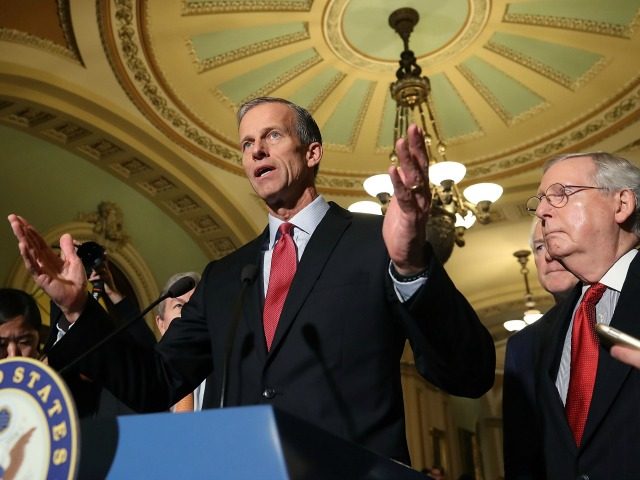Business-first Republicans Senators are pushing a plan to keep the 680,000 DACA illegals in the workforce — and simultaneously block President Donald Trump’s popular reforms of immigration law.
The plan would provide work-permits to at least 680,000 illegals but would also provide Trump with a $25 billion “Trust Fund” for construction of a border wall.
The proposal by South Dakota’s John Thune, Ohio’s Rob Portman, and Kansas’ Jerry Moran, likely has support from many business-first Republicans, especially GOP Senators in labor-intensive agricultural states. The proposal likely will be pushed into the 2018 budget debate as Trump’s deputies press for $1.6 billion in 2018 border-wall construction funds.
A statement from the Senators buried the economic payoff under Democratic-style praise for the 3 million blue-collar illegal-immigrant ‘”Dreamers”:
This commonsense legislation would fulfill several urgent short- and long-term needs, which include extending permanent protection to today’s Dreamers who are facing an uncertain future and finally taking a meaningful step toward enhancing border security, which is a priority for the president and a majority of us in Congress,” said Thune…
“Our nation has long valued diversity – of thought, of ideas, of background – and we must continue to foster this American spirit,” said Moran. “Congress has a responsibility to develop a humanitarian plan that cares for the children who were brought to the United States by their parents through no choice of their own and at the same time protects our homeland.
That amnesty-for-a-wall plan offers big gains for business — more cheap labor to keep Americans’ wages low, less debate over cheap-labor immigration, and a strategy to block Trump’s several pro-employee reforms.
The Trump reforms are hated by business groups because they gradually shrink the supply of new legal immigrants and nudge up Americans’ wages.
For example, business groups have sharply opposed Trump’s plan to curtail legal immigration via the visa-lottery and chain-migration reforms. In the February 15 immigration-reform votes, for example, eight GOP business-first Senators voted for a Democratic-backed double-amnesty plan, and 14 GOP Senators voted with Democrats against Trump’s four-way combination of an amnesty, a border wall, asylum reforms and legal immigration cuts.
Thune and Moran both voted against Trump’s wage-boosting reforms.
If Trump takes the new amnesty-for-wall deal, he will give up most of his bargaining power — the offer of amnesty to illegals — and so lose any chance of passing the wage-boosting immigration reforms which got him elected in 2016.
Moreover, if he takes the deal, he will be less able to campaign for immigration reforms during the 2018 midterm elections, and will instead just have to play up the benefits of the tax cuts. That is a big benefit for business groups who do not want GOP candidate to campaign for immigration reform in November. Basically, the proposed deal would allow the business community to push immigration reformers under the table for several years.
Many Democratic legislators, will favor parts of the business-first amnesty-for-a-wall plan.
Democrats will support the business-Senators’ rejection of Trump’s proposal to reform the asylum laws. Those laws now allow hundreds of thousands of Central American migrants to walk through the existing border wall. Democrats will also support the rejection of Trump’s proposed reform to chain migration and the visa lottery.
Democrats, however, will want to include many additional illegals in the business-first wall-for-amnesty plan.
Also, Democrats want to put the illegals on a path to citizenship. Once the illegals become citizens, they can vote for Democrats and use the chain-migration laws to win citizenship and voting rights for millions of additional migrants.
However, GOP Senators strongly oppose citizenship for illegals because they recognize it expands the Democrats’ ballot-box power. But a deal that offers work-permits to illegals will allow them to work but not vote, which helps GOP donors and GOP Senators.
Four million Americans turn 18 each year and begin looking for good jobs in the free market.
But the federal government inflates the supply of new labor by annually accepting roughly 1.1 million new legal immigrants, by providing work-permits to roughly 3 million resident foreigners, and by doing little to block the employment of roughly 8 million illegal immigrants.
The Washington-imposed economic policy of economic growth via mass-immigration floods the market with foreign labor, spikes profits and Wall Street values by cutting salaries for manual and skilled labor offered by blue-collar and white-collar employees. It also drives up real estate prices, widens wealth-gaps, reduces high-tech investment, increases state and local tax burdens, hurts kids’ schools and college education, pushes Americans away from high-tech careers, and sidelines at least 5 million marginalized Americans and their families, including many who are now struggling with opioid addictions.


COMMENTS
Please let us know if you're having issues with commenting.